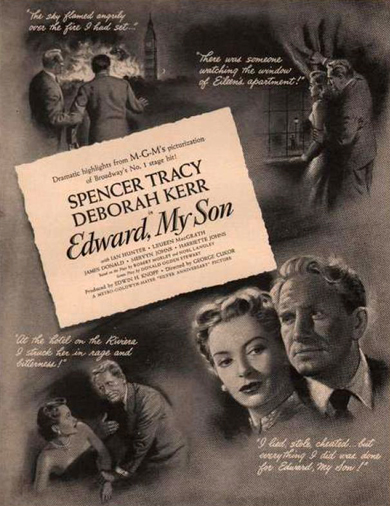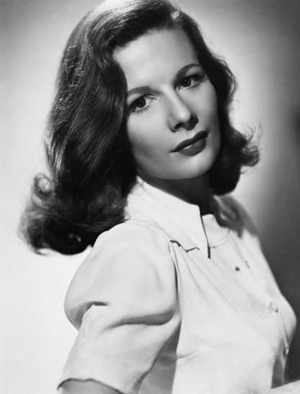
 |
|
|
|
The postwar years brought out a lot of dramatic soul-searching as writers tried to define a moral malaise that was felt as the years of wartime high morale and positive yearnings went sour. After a steady diet of stories proclaiming that the world would be changed for the better when the victors came home, some major plays concentrated instead on misplaced values, selfishness and corruption: Death of a Salesman, All My Sons. Noir dramas like House of Strangers and Ruthless followed suit, tainting the business world as somehow corrupt at its core. Unscrupulous businessmen existed before the war, of course/ Perhaps the ordinary citizen back from war took a more cynical attitude toward things. 
Robert Morley and Noel Langley's 1947 play Edward, My Son is a straightforward play about a great English Lord of industry who uses his power and money to cruelly selfish ends. The 1949 MGM movie version was filmed in England with top artists on both sides of the camera. Its leading lady Deborah Kerr was nominated for a Best Actress Oscar. But the best efforts of director George Cukor and a fine supporting cast are done in by a serious casting misstep: a movie that could have been great is now fairly obscure. The story is told in flashback. We see 27 years in the lives of Arnold and Evelyn Bolt (Spencer Tracy & Deborah Kerr), a young English couple at the finish of WW1 who celebrate the first birthday of their beloved son Edward. A frequent companion is Doctor Larry Woodhope (Ian Hunter), who loves Evelyn but declares his feelings only once. Like her husband, Evelyn is devoted to little Edward. Arnold is a sharp businessman from the first. He partners with Harry Sempkin (Mervyn Johns of Dead of Night) in an undercapitalized furniture store. When Edward needs an expensive operation to cure a problem with his hip, Arnold commits arson to come up with the cash. That's the beginning of Arnold's swift rise to fame, fortune and power. The new captain of industry bribes a school headmaster (Felix Aylmer) to keep the incorrigible Edward from being expelled. Evelyn complains about the way Arnold spoils his son, but the great man listens to no one. Business scandals cause associates to go to prison, including Harry, but Arnold takes care to remain untouched. He lies to the police to avoid being tainted by a suicide, and when Evelyn grows distant he has an affair with his secretary (Leueen MacGrath). When that indiscretion blows up in his face, Arnold prevents a divorce by threatening to drag Evelyn's name in the mud with lies about her relationship with Dr. Woodhope. Even though Arnold uses his power to oppress those he loves, he has no absolutely no misgivings about his villainous actions. No matter how much praise Spencer Tracy gets for his innately natural acting, the fact remains that he isn't right for every role. Not only is he often miscast, but when he's cast too closely to type he can be just plain dull. Audiences love Tracy's personality, but even in some of his "great" roles he seems to be giving very little of himself. Spencer Tracy pretty much neutralizes this play adaptation by refusing to interpret a complex role. He instead plays his patented neutral character, so that Lord Arnold Boult is simultaneously a warm and caring man and a completely ruthless rat. 
Great men described as charismatic but flawed have always been fascinating; Orson Welles' Citizen Kane is the most famous example. The great director uses expressionist cinematics to examine the puzzle around Charles Foster Kane while keeping him at a remove. Although Kane does villainous things, he is never "explained away" - we ultimately neither understand nor know him. Edgar Ulmer's 1948 Ruthless uses a similar flashback structure, but neither the casting of the hiss-able Zachary Scott nor the screenplay give the rotten villain Horace Vendig a chance; the point of the film's subversive story is that any system that encourages creeps like Vendig is itself rotten. Edward, My Son wants to say something about the curse of power and ambition, but Tracy's performance doesn't give us a clue. In a wraparound segment Lord Arnold talks directly to the audience and asks for understanding, as if he regrets his life of misdeeds. In the film proper Arnold never once admits wrong or even seems capable of doing so. It won't add up no matter how one looks at it. The wraparound may be part of the stage play, but it comes off as an add-on that dulls the whole point of the show. Authors Morley and Langley put some teeth into their play, which would seem to indict bigwig industrialist Britons as crooks and hypocrites... think Lord Beaverbrook, the power broker that Winston Churchill had to fire from his war cabinet. The film defuses this by making Arnold a Canadian so Tracy won't have to bother with a British accent. I'm guessing that the film's message is that great men spoil and ruin their children in an attempt to live on beyond themselves, to defy death. Arnold already claims the right to control other people and force them to his will. Because he considers his son an extension of his person, he's really indulging and spoiling himself. From the way Tracy plays the part, we can't tell if he's even bothered to read the script or knows what it is about. Arnold seems to be a nice guy who went bad because he bent the rules to get an expensive operation for his son. His last words are to ask what we would have done in his place. The movie is neatly broken up into stage acts, several of which begin with shots of Edward's birthday cake with new candles on it. The movie also retains the play's conceit of never actually showing Edward. We instead imagine what a little b______ he must be, and perhaps project people we've met onto him. This aspect of the film is very successful, and natural to our experiences. We all have associates outside the home that hear about our children but have never seen them. They therefore must imagine them from our descriptions. How many of us have heard other people making excuses for their children? If the kids have problems, it's invariably somebody else's fault. 
Actress Leueen MacGrath Deborah Kerr's unhappy Evelyn undergoes a radical deterioration as she self-destructs in the last reels; although the performance is a bit overstated, Kerr seems to physically change without much in the way of makeup. Her face even appears to squash out. It makes a good contrast with the highly mannered, severely stylized work of Bette Davis in Mr. Skeffington. Also a standout is the forever likeable Mervyn Johns, who often played a sort of English Elisha Cook Jr.. He's just the sort of guy that Arnold Boult would knife in the back, and still feign a close friendship. Ian Hunter is more or less a place-keeper for a more interesting performer -- the Doctor's passion for Evelyn is simply not there. Of the British actors, favorite James Donald receives very high billing but is on screen in one scene only, very briefly, which may be an indicator of some editorial reshuffling in post-production. An actor we wish we could see more of is Leueen McGrath. As Arnold's amorous secretary she heats up the screen with an intelligent passion. Leueen played the role on Broadway (Robert Morley played Arnold) and was picked up for the movie when Cukor, Tracy and Katherine Hepburn decided that Hepburn shouldn't take a small role in Kerr's shadow. The old Hollywood rules of casting could really put a strait-jacket on a production. Edward, My Son is very much an MGM film from the late '40s, marketed on the proposition that audiences ought to attend just because the famous logo insures a Tradition of Quality. Filmed in England, this show at least breaks free of the over-lit MGM look for much of its running time. It's a very handsome production, and unlike some MGM duds of the late 1940s, is well written and holds our full attention. 
The Warner Archive Collection DVD-R of Edward, My Son is a Remastered Edition and overall looks great, although a reel change or two has some dings and Freddie Young's low-key lighting makes some negative dirt all the more visible. The sharp picture and very clear sound are a definite plus. MGM's original trailer is included; it makes a big deal of the studio's 25th anniversary year but refrains from overselling the show, as the studio did many of its pictures around this time.
On a scale of Excellent, Good, Fair, and Poor,
Edward, My Son rates:
Reviews on the Savant main site have additional credits information and are often updated and annotated with reader input and graphics. Also, don't forget the 2011 Savant Wish List. T'was Ever Thus.
Review Staff | About DVD Talk | Newsletter Subscribe | Join DVD Talk Forum |
| ||||||||||||||||||